---------------------------------------------------------
Incubating eggs & having newborn chicks around can be a lot of work. Hatching eggs with a broody hen allows nature and instinct to take over all the work for you. Letting the hen care for the eggs relieves you of the chore of tending an incubator, turning the eggs, monitoring the humidity & temperature or buying expensive equipment. Letting the hen mother the chicks means you don’t have to clean a brooder or have chicks in your house. You can also get a huge variety of breeds when ordering hatching eggs, so it’s a great way to add some rare breeds, and it can be a great educational experience for you & your family!
Great! I can’t wait to hatch my own chicks!
A few quick downsides to consider before we get started. I have found that the chicks raised by a mother hen tend to be a bit more skittish around humans. When we brood chicks in our house, we spend lots of time holding the chicks and bonding with them. When the mother takes over raising the young, human interaction is more limited.
The second drawback is you don’t have any control over if you get male or female birds. If your town doesn’t allow roosters, or you don’t want to keep a rooster (or several roosters if you end up hatching all boys!), you will want to come up with a plan for any boys.
Even with these drawbacks, I still feel it’s a great, super easy way to raise chicks. Ready to get started?
Broody Hen
First things first – to get started you need to have a broody hen. How can you tell if your hen has gone broody? Click here to read all about broody hens. She will sit on her nest nearly all the time, only getting up a few times per day to eat, drink & relieve herself. Don’t be alarmed at the change in her poop – they will be much larger, and much smellier – that is completely normal because she is generally only pooping once or twice a day.
When sitting on the nest, she will spread way out, often backed against a wall with her tail up. Many hens will pull out chest or underside feathers to line the nest and to allow her skin to contact the eggs to help keep them warm. But I feel like the biggest giveaway is the hen will stay in the nest box all night long and not roost with her fellow flockmates.
Some hens can get aggressive defending their nest – not letting their flockmates in, or pecking at you if you try to touch them. We have never had this issue with any of our broody hens, not even ones incubating eggs or raising chicks, so this is just a individual personality issue. Wait a couple days to make sure your hen is committed to staying broody for the long haul and then you are good to go!
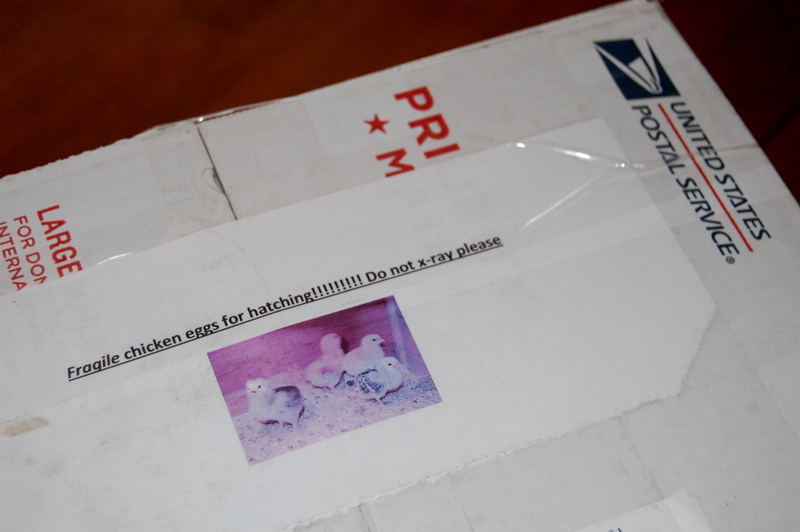
Where can I get fertile eggs?
If you have a rooster you’ll have an endless supply of fertile eggs. But what if you don’t have a rooster? You can find fertilized eggs very easily online. Most hatcheries that sell baby chicks also sell fertilized eggs. You can also try searching sites like Craigslist or eBay. Pick any breed you are interested in and search that breed + fertile hatching eggs and you will no doubt find several sources.
If you know other local chicken keepers or farms with roosters, this is the best way to obtain fertilized eggs. Eggs that have shipped through the mail can have a lower hatch rate than non-shipped eggs. Rough handling during transit or swings in temperature can effect fertility. The best time to have fertilized eggs shipped is late winter through early summer, when temperatures are neither too hot or too cold, and the chicks will have time to feather out before winter hits.
Where should I let the hen brood?
If you have a broody hen, she has no doubt chosen her favorite nesting spot to raise her chicks. This can be a problem if it also happens to be the favorite nesting spot of the rest of your flock and she is aggressively defending it. I have not encountered this problem – my hens all seem to WELCOME friends in the nest box. The visitors lay their egg in the box and the broody hen will steal it to add to her clutch. I have also noticed the broody mom will take advantage of having a “babysitter” in the box. When one of the other hens comes in to lay an egg, the mom can have a chance to get up, stretch her legs and get some food or water. Most times, the visiting hen will sit on the clutch of eggs to continue keeping them warm.
My preference is to allow the hen to brood where she chooses. She knows best, and has picked a place she feels safe & comfortable. To move her, you risk “breaking” her – making her decide against being broody. It also allows her to stay with the flock, where she can still socialize and eat and drink as normal.
The benefits of moving her include making it easier to keep track of the eggs (remember the above example where she steals her friend’s eggs?). It allows her peace & quiet without other hens coming in and out of the box, and it minimizes the chance of egg breakage if other hens are bumping around in the nest.
If you decide to move her to a private brooding pen, get everything set up in advance. Have an enclosed nest area and an outdoor area where she can stretch her legs and relieve herself, along with plenty of fresh water & food. Gently place the eggs in the nest. Wait until dark to move her, when she is sleepy and less likely to protest.
Giving the hen her eggs
When you get your eggs in the mail, carefully unwrap them. The shipper has no doubt wrapped each egg in layers of bubble wrap to keep them safe! Check each egg over to ensure it survived the journey and they aren’t cracked. If they are a little dirty, that is not a problem. You DO NOT want to wash them. Egg shells might seem solid, but they are actually covered in pores (this is how the developing chick inside gets oxygen!). The shell is covered in an invisible layer, called a bloom, which keeps bacteria out. You don’t want to wash the bloom away. click here to read more interesting facts about how chicks develop inside the egg
Before bringing the eggs to the hen, mark each egg with a pencil. You want to mark each egg because hens will steal other hen’s eggs to add to their clutch and you don’t want her adding too many unfertilized eggs and not having room to incubate the fertilized ones. It’s also helpful to mark each egg if you will be candling them to monitor the progress (more on that later). I number my eggs to easily keep track of them.
Now it’s time to give the eggs to the hen! If your hen is being aggressive, it might be best to wait until she leaves the nest to eat. Then you can position the eggs without getting pecked at. If your hen is letting you touch her, you can just take the eggs and very gently lift her up and place the eggs underneath.
And now…..you wait
Generally speaking, the eggs should hatch about 21 days after incubation has begun. Circle it on your calendar so you can be on the lookout, but it could be a few days earlier or later. Beyond this, there is not much else you need to do. Keep an eye on your hen’s health. Make sure she is getting up to eat and drink. Some hens are so devoted to mothering their eggs they forget to take care of themselves. If you notice your hen is not getting up, try removing her from the nest and setting her in the run with a tasty treat (mealworms are a great source of protein!). It is fine for her to be off the nest for 20-30 minutes, this will not hurt the eggs.
When you see your hen is off the nest, it is a good time to check the eggs yourself. Make sure that the mom hasn’t taken in extra unfertilized eggs, and check to see none of the eggs have cracked. If an egg has cracked, there is not much you can do but remove the egg. It will not continue to develop and will start to smell rotten, and worse could spread bacteria to the other eggs.
Unfortunately, not all fertilized eggs will develop properly. There are many reasons, it could be uneven heating (if the hen is off the nest too often, or has too many eggs to properly keep them all covered) or genetic issues. Somehow, hens instinctively can tell if an egg is not developing properly and will kick it out of the nest. If you notice an egg outside of the nest, I would recommend putting it back. If you notice the egg is outside the nest again later there may be something wrong and it’s time to candle the egg.
Candling eggs
Candling an egg is sort of like getting an ultrasound – it gives you a glimpse of what is going on inside that shell. Warning – it can be addictive! It’s tempting to want to candle them everyday to check and make sure everything is ok. It’s the same kind of feeling I remember having when I was pregnant, I remember constantly wishing I had an ultrasound machine in my house to check on the baby! But really, it’s best to leave the embryo to develop without too much interference.
The only time I candle eggs are at 10 days to see which ones are developing, and if I suspect something is wrong. “Candling” is the process of shining a light through an egg to see inside of it. It got it’s name because farmers used to do this with – you guessed it – a candle. They would hold the egg over the flame of a candle in a darkened room. Thankfully, we have better options now, as holding an egg over an open flame too long could cook it! For $40-$50 you can purchase a commercially made candler called an ovascope, for about half that you can buy a special candling flashlight. Unless you are planning on candling lots of eggs in the future this is not necessary at all. You can get good results using any bright flashlight – or even your cell phone.
Wait until it’s dark or take the eggs into a dark room. Make a fist and place the egg on top. BE CAREFUL NOT TO DROP THE EGG! Shine the flashlight directly under the egg until it illuminates the contents. An undeveloped egg will be clear and possibly will smell a bit rotten if it’s been a week or two in the nest. Inside a developing egg you will see a network of blood vessels coming out of the center of the embryo. You should also see a clear area where the air sac is. There is not much to see before day 7. I usually wait until day 10 before I candle for the first time.
Your eggs should all be numbered to help you keep track of which ones are developing. Take a notepad. I like to rate each egg as I candle it on a scale of 1-5. Five is an egg that has an excellent blood vessel network and a defined air sac, down to a one which looks to be clear or has very little development.
Any of the eggs that are rated one-three I will candle again in six days to see if they have any change. If by day 16, you can not see any development you should remove the egg from the nest (if the hen hasn’t already kicked it out). I only recheck the eggs rated four or five if I suspect there is a problem. After day 17 you should NOT candle the eggs. They should be moved as little as possible in the final days of incubation.

Hatch Day!
Hatch day is such an exciting time! It’s tempting to get involved, but it’s best to let the mom handle things. The eggs should not be removed from the nest, they need to stay with their mom where she can keep them warm. It can be hard to hear the chicks struggle to get out of the egg and it can sometimes take hours. You aren’t helping them by picking at the shell or removing them. They need the struggle to build their strength. If your hen has not been aggressive during her brood, she may let you watch as the chicks are hatching, but if she seems nervous or upset by your presence, it’s best to leave her alone. Lucky for us, our hens are very patient!
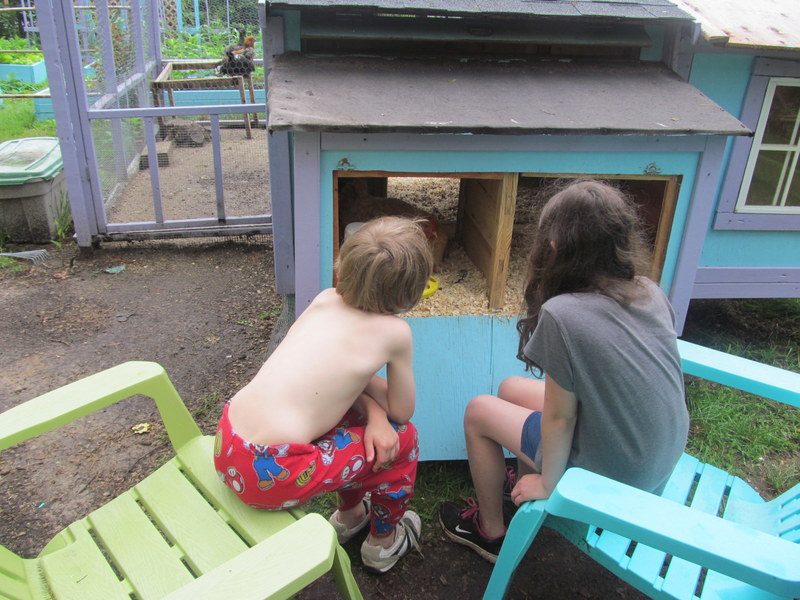
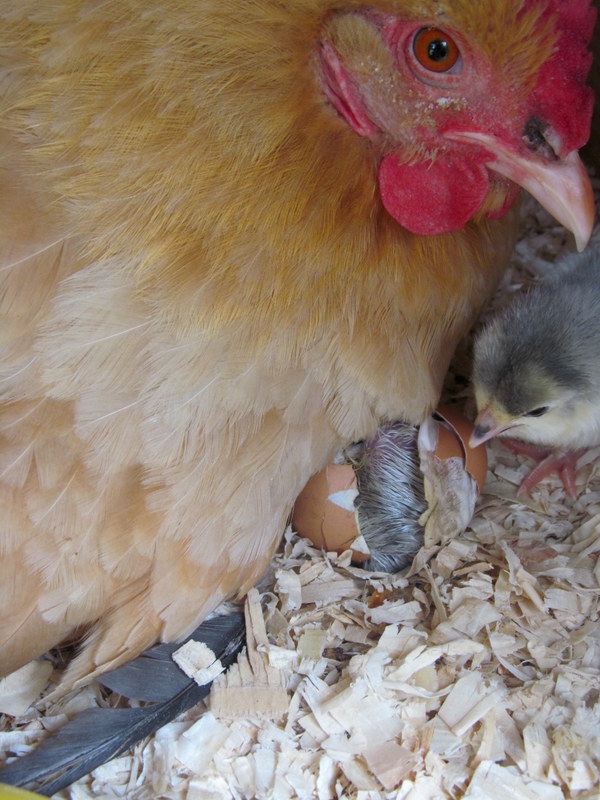
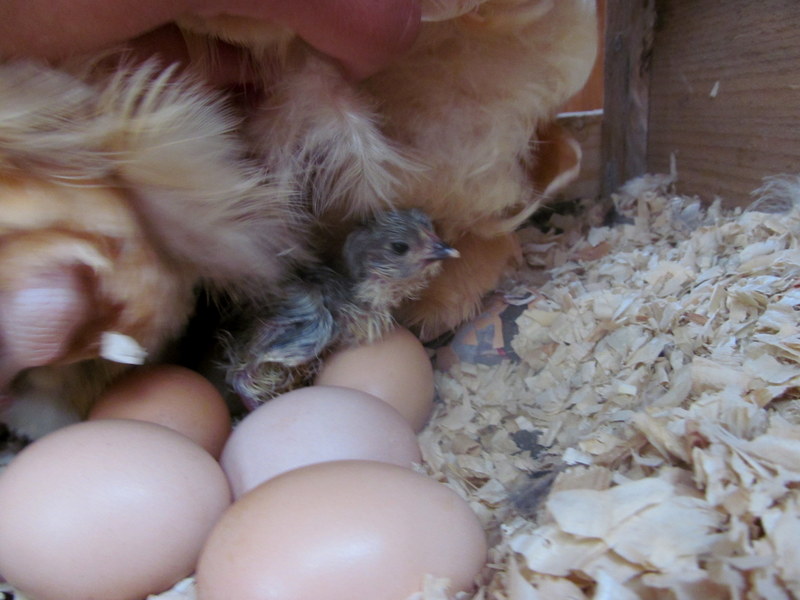

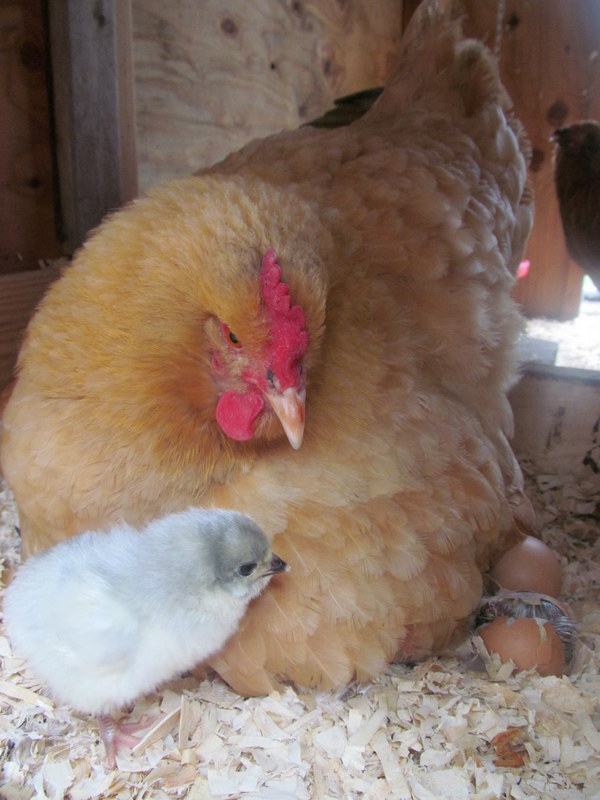
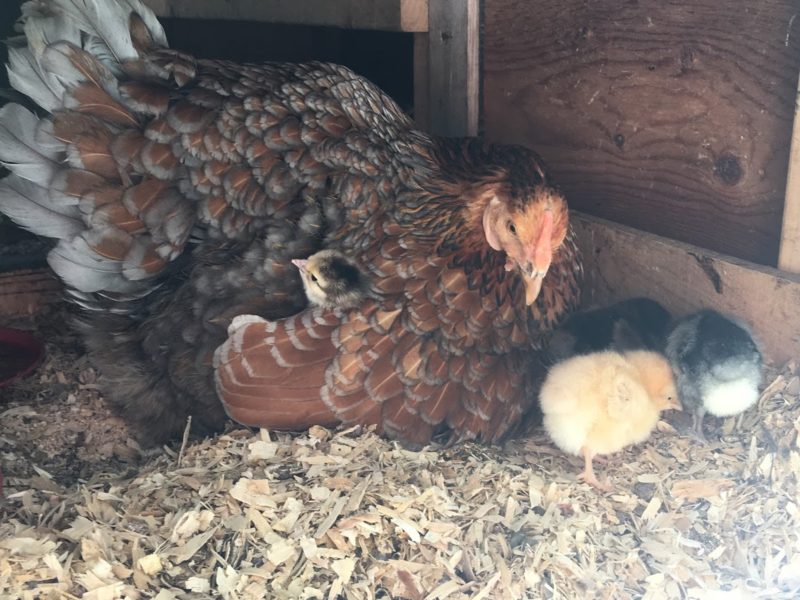
Raising the Chicks
The last decision is what to do with the chicks. You can remove the chicks and raise them in a brooder yourself. You can leave them with their mom and the flock, or you can remove mom & babies and put them in a private brooding pen.
I have always left the mom & babies with the rest of the flock. The mom will defend them if anyone looks at them funny, and then you don’t need to worry about integrating them into the flock later. It’s less disruptive to everyone. If you remove mom, eventually you have to go through the integration process again when you reintroduce her to her flockmates.
The new family will not leave the nest for the first couple days. You should provide chick starter food & water for the new family right in the box. As long as the babies are in with the flock, the entire flock needs to be switched over to chick starter feed. Layer feed can damage the kidneys of chicks. You will need to provide a dish of crushed oyster shells to help supplement the laying hen’s diet. The mother hen will take care of keeping them warm & entertained so there is no need to provide additional warmth through a heat lamp.
Leaving the nest
When the hen feels the chicks are old enough to live on their own (usually around 7-9 weeks), she will abandon the chicks and start roosting with her flockmates. She may even peck at the chicks if they keep trying to stay underfoot. The first time we hatched eggs with a broody, the baby we kept continued to have a special relationship with her momma hen. The baby would lay in the nest as momma hen laid eggs well into adulthood. When the “baby” got sick at around 2 years old, the mother hen would stand over her, even bringing her treats. I think it was her mother’s love that helped her get better. Buff Orpingtons are well known as being great mommies, and she certainly was. It was a very special bond. 🙂

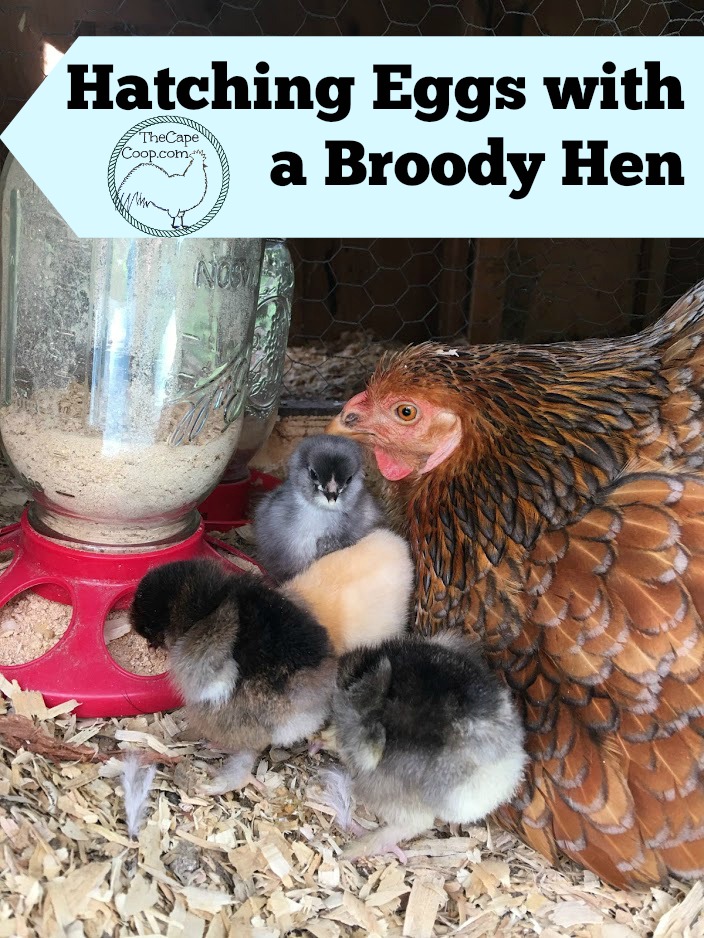



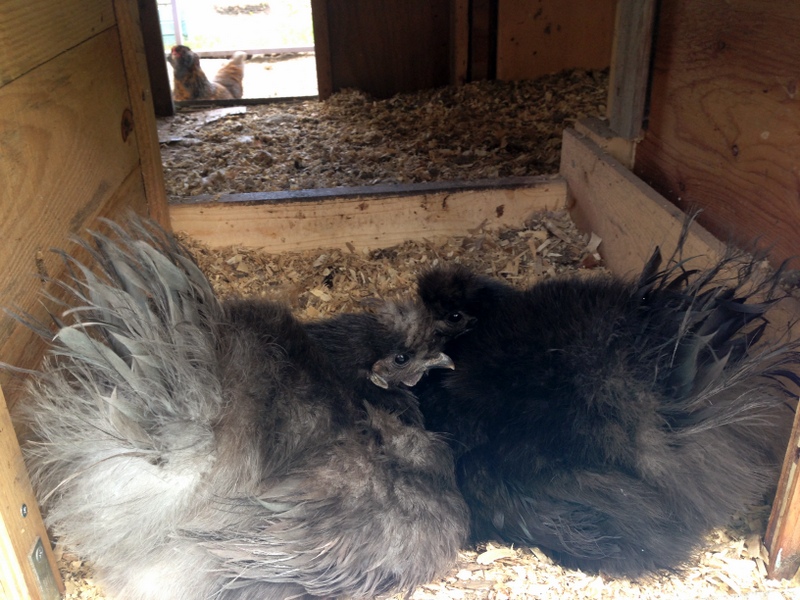
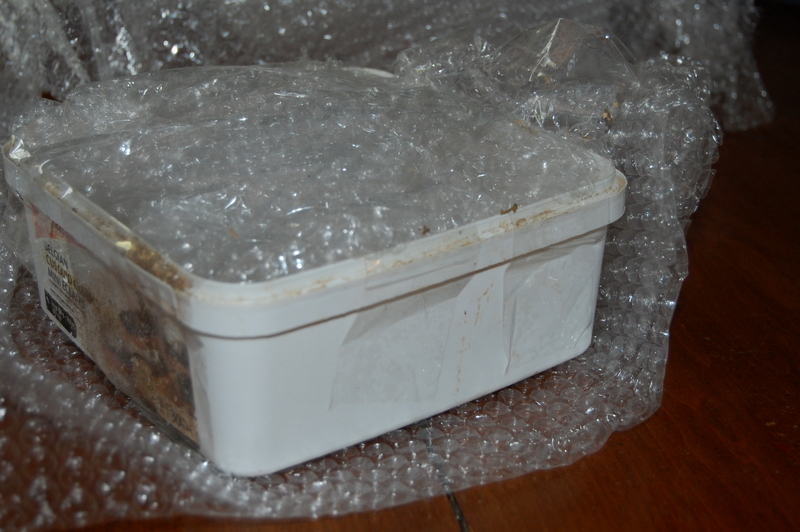
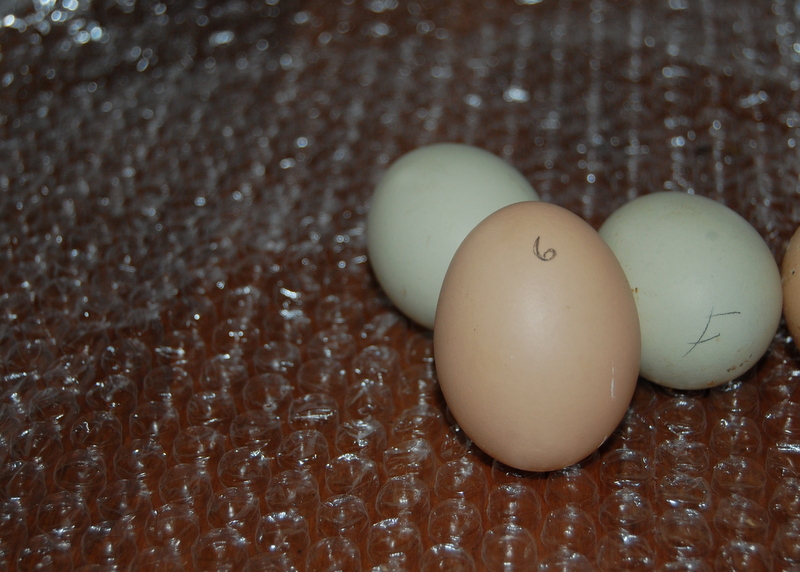
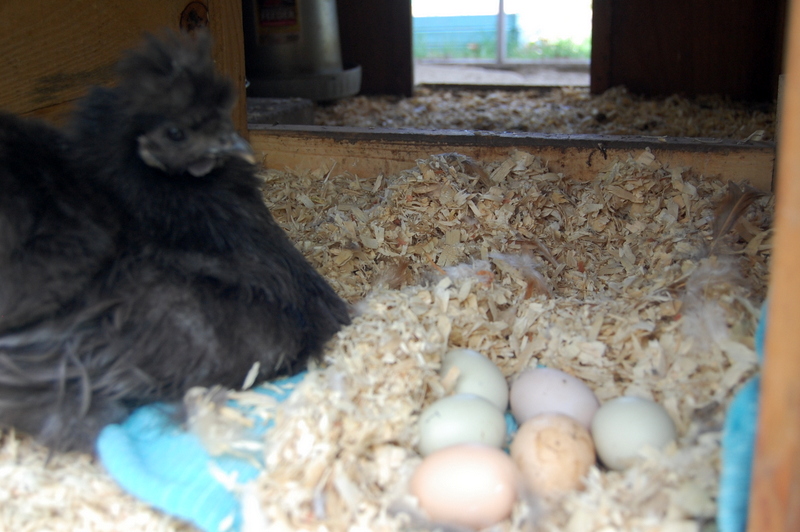
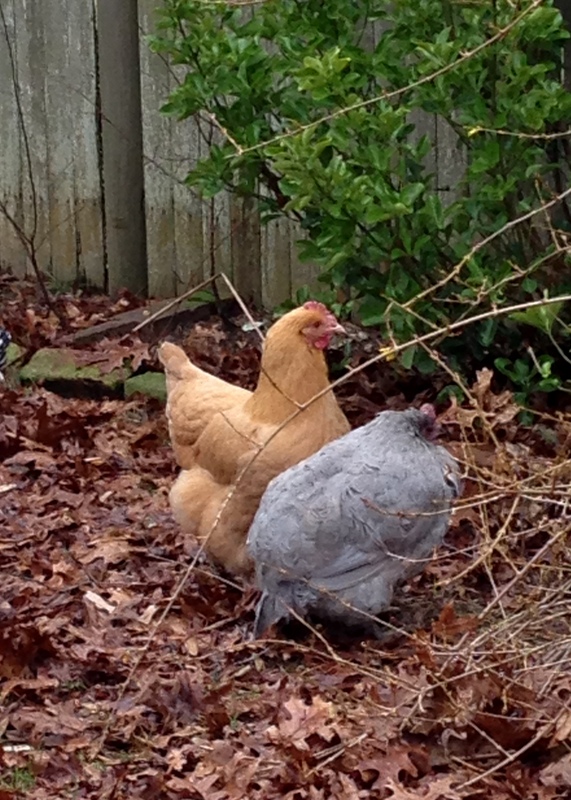

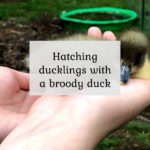

Kristen
Sunday 19th of September 2021
I have a mama hen and her 3 chicks in a separate area in the coop. They can’t get out but I want to know when I can let them out to free range outside of their space and the coop with the rest of the flock.
Liz
Monday 20th of September 2021
I have always just let momma hen decide that - it usually happens around day two. By then the family has bonded, the chicks will stay very close to mom and mom will defend them in anyone looks at them sideways. But if the rest of your flock is very aggressive you might want to keep them separate until the chicks are much bigger (4-6 weeks at least)
Haylee
Friday 7th of May 2021
My hen (first time mother) has been sitting on eggs for nearly 25 days now and no sign of any pipping. She hasn’t thrown any out and we carefully candled 2 the other night and the eggs are full of chick. What should I do? Are they late? Or do they need extra help pipping? I have heard that temperature decrease makes them hatch later and was wondering if maybe every time she gets up to eat, drink, and poop if that decrease in temp. is what’s causing them to hatch later. And this is our first time using a broody hen
Liz
Monday 10th of May 2021
Is it possible you are just off on your dates? That is pretty late for viable eggs to be going. Temperature and humidity definitely play a large role, but it's normal that the mother should be getting up a couple times per day to take care of her needs. Hopefully you get some chicks soon!
Anastasia
Saturday 16th of May 2020
Our hen just had two hatchlings; however, there are about seven other eggs in the nest. The nest is in the coop area and they (mama and babies) are now on the first floor (think 1.5 story chicken coop with ramp). We closed up the coop because the chicks got out, but Mama did not want to leave the coop was frantically trying to get them inside safely. The chicks tried, but could not make that 2.5 in jump. We put them back in and the three seem very content; however, the other eggs are not being kept warm. We placed hay over them while I research answers. Our chickens, about 18 are free range beyond the coop, but they love their coop for roosting and sleeping. Do we move Mama, babies, and eggs?
Liz
Saturday 16th of May 2020
Mama should definitely not be leaving the nest with viable eggs still in it. They need that warmth right up until the end. Mother hens are pretty good at sensing when eggs are not viable, they can feel the movements of the babies inside the eggs and can hear them peeping as they get ready to hatch. Have you candled the eggs to see if they were developing normally? If she is not sitting on them at all anymore it could be that she gave up on them. If it's been several hours, unfortunately they might have passed away. Definitely try to encourage her to stay on the nest - can you wire off the nest box area so she has less space to roam? If you don't have an incubator and the mama won't stay on the nest, there is not much that can be done. As a last resort you could try keeping them under a heat lamp, but they really do best with steady temperature and humidity levels which will be hard to achieve with just a heat lamp
Pam
Thursday 30th of April 2020
Will a broody hen stop laying eggs, once the fertile period is over, or do you have to continue to check for eggs everyday after that?
Liz
Thursday 30th of April 2020
She will continue to lay eggs while she is assembling her clutch. Once she is content her clutch size (usually 8-12 eggs) she will start incubating them. This way they all develop at the same time. Once she starts incubation she will only leave the nest once or twice a day and she will stop laying eggs. If you have other chickens in with her, they could be leaving eggs with her or she could steal them from other nest boxes. I like to mark the fertile, incubating eggs and then check the nest every couple of days for eggs that don’t belong
Kristen Leveille
Saturday 1st of June 2019
Should add they all free range on our property during the day where ever they want and they pit themselves to bed at night. I'm not sure if that makes a difference in moving them or let them naturally learn.
Liz
Saturday 1st of June 2019
I am all for letting the moms do their thing. We let them stay in the nest box and don’t move them. The babies hatch and live in the flock from day one. Mom takes them out to free range in the yard and brings them back at the end of the day. I keep an eye on my rooster and any grouchy hens but honestly no one has ever tried anything and mom protects them. The chicks usually need my help for a day or two navigating the ramp up to the coop at the end of the day but other than that I don’t interfere much